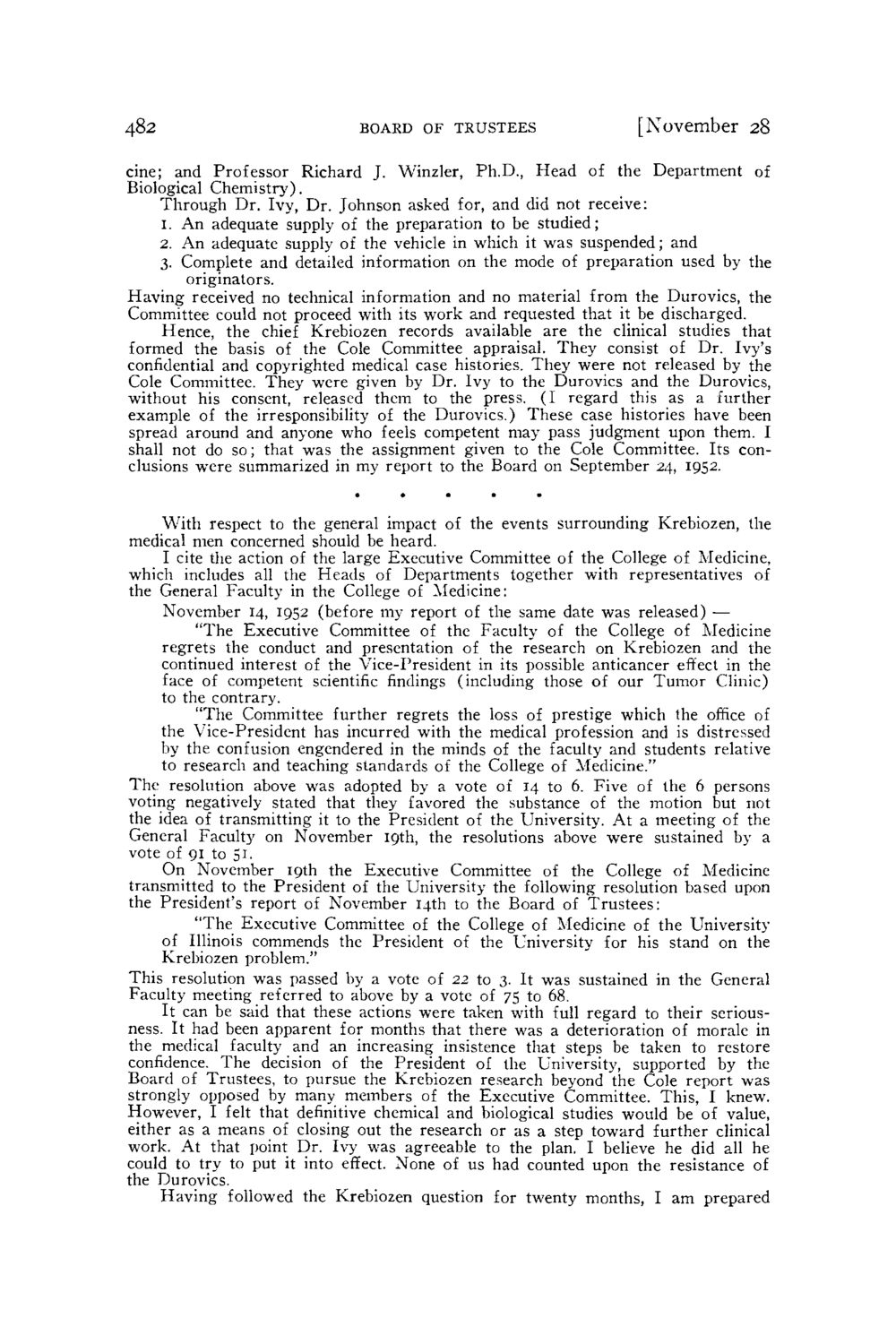| |
| |
Caption: Board of Trustees Minutes - 1954
This is a reduced-resolution page image for fast online browsing.

EXTRACTED TEXT FROM PAGE:
482 BOARD OF TRUSTEES [November 28 cine; and Professor Richard J. Winzler, Ph.D., Head of the Department of Biological Chemistry). Through Dr. Ivy, Dr. Johnson asked for, and did not receive: 1. An adequate supply of the preparation to be studied; 2. An adequate supply of the vehicle in which it was suspended; and 3. Complete and detailed information on the mode of preparation used by the originators. Having received no technical information and no material from the Durovics, the Committee could not proceed with its work and requested that it be discharged. Hence, the chief Krebiozen records available are the clinical studies that formed the basis of the Cole Committee appraisal. They consist of Dr. Ivy's confidential and copyrighted medical case histories. They were not released by the Cole Committee. They were given by Dr. Ivy to the Durovics and the Durovics, without his consent, released them to the press. ( I regard this as a further example of the irresponsibility of the Durovics.) These case histories have been spread around and anyone who feels competent may pass judgment upon them. I shall not do so; that was the assignment given to the Cole Committee. Its conclusions were summarized in my report to the Board on September 24, 1952. With respect to the general impact of the events surrounding Krebiozen, the medical men concerned should be heard. I cite the action of the large Executive Committee of the College of Medicine, which includes all the Heads of Departments together with representatives of the General Faculty in the College of Medicine: November 14, 1952 (before my report of the same date was released) — "The Executive Committee of the Faculty of the College of Medicine regrets the conduct and presentation of the research on Krebiozen and the continued interest of the Vice-President in its possible anticancer effect in the face of competent scientific findings (including those of our Tumor Clinic) to the contrary. "The Committee further regrets the loss of prestige which the office of the Vice-President has incurred with the medical profession and is distressed by the confusion engendered in the minds of the faculty and students relative to research and teaching standards of the College of Medicine." The resolution above was adopted by a vote of 14 to 6. Five of the 6 persons voting negatively stated that they favored the substance of the motion but not the idea of transmitting it to the President of the University. At a meeting of the General Faculty on November 19th, the resolutions above were sustained by a vote of 91 to 51. On November 19th the Executive Committee of the College of Medicine transmitted to the President of the University the following resolution based upon the President's report of November 14th to the Board of Trustees: "The Executive Committee of the College of Medicine of the University of Illinois commends the President of the University for his stand on the Krebiozen problem." This resolution was passed by a vote of 22 to 3. It was sustained in the General Faculty meeting referred to above by a vote of 75 to 68. It can be said that these actions were taken with full regard to their seriousness. It had been apparent for months that there was a deterioration of morale in the medical faculty and an increasing insistence that steps be taken to restore confidence. The decision of the President of the University, supported by the Board of Trustees, to pursue the Krebiozen research beyond the Cole report was strongly opposed by many members of the Executive Committee. This, I knew. However, I felt that definitive chemical and biological studies would be of value, either as a means of closing out the research or as a step toward further clinical work. At that point Dr. Ivy was agreeable to the plan. I believe he did all he could to try to put it into effect. None of us had counted upon the resistance of the Durovics. Having followed the Krebiozen question for twenty months, I am prepared
| |